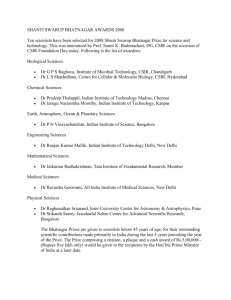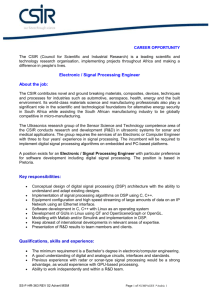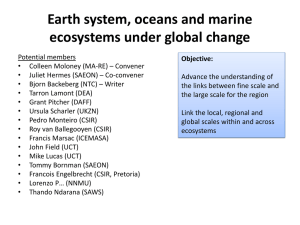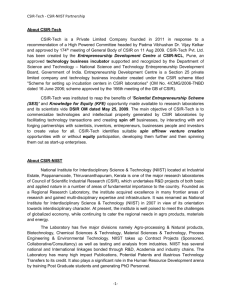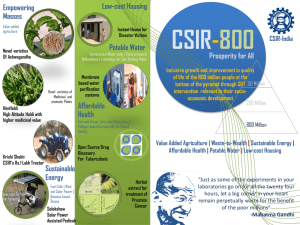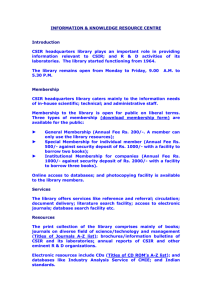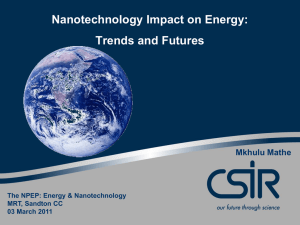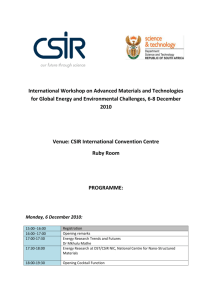It is a matter of great pleasure for me to be amidst you at this meeting
advertisement
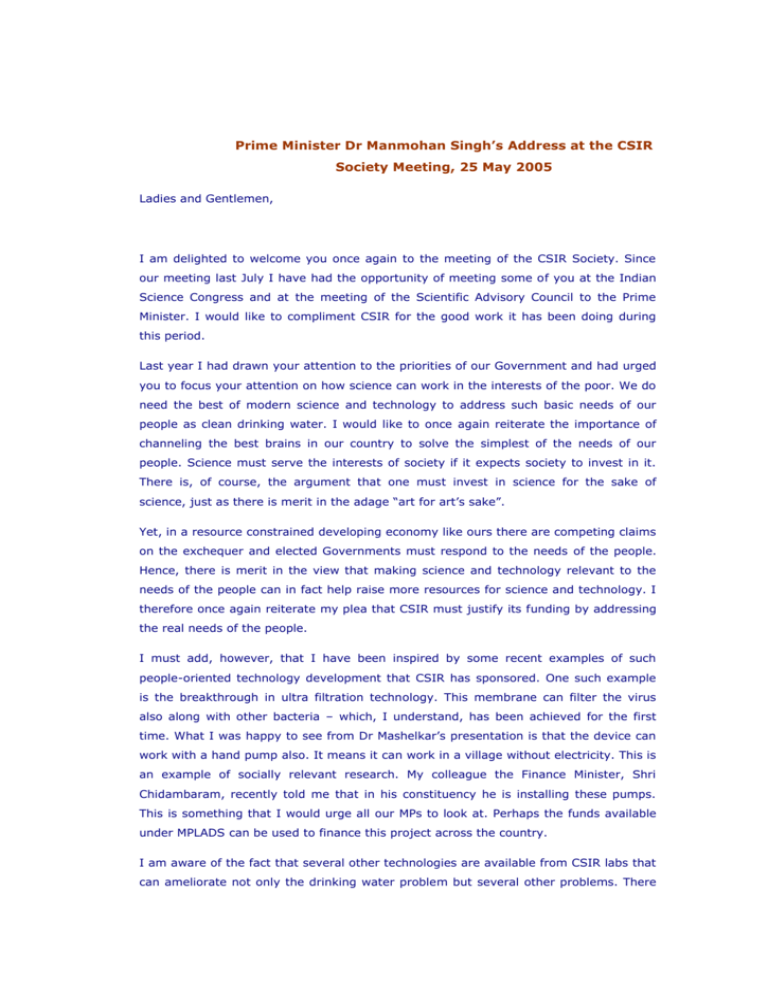
Prime Minister Dr Manmohan Singh’s Address at the CSIR Society Meeting, 25 May 2005 Ladies and Gentlemen, I am delighted to welcome you once again to the meeting of the CSIR Society. Since our meeting last July I have had the opportunity of meeting some of you at the Indian Science Congress and at the meeting of the Scientific Advisory Council to the Prime Minister. I would like to compliment CSIR for the good work it has been doing during this period. Last year I had drawn your attention to the priorities of our Government and had urged you to focus your attention on how science can work in the interests of the poor. We do need the best of modern science and technology to address such basic needs of our people as clean drinking water. I would like to once again reiterate the importance of channeling the best brains in our country to solve the simplest of the needs of our people. Science must serve the interests of society if it expects society to invest in it. There is, of course, the argument that one must invest in science for the sake of science, just as there is merit in the adage “art for art’s sake”. Yet, in a resource constrained developing economy like ours there are competing claims on the exchequer and elected Governments must respond to the needs of the people. Hence, there is merit in the view that making science and technology relevant to the needs of the people can in fact help raise more resources for science and technology. I therefore once again reiterate my plea that CSIR must justify its funding by addressing the real needs of the people. I must add, however, that I have been inspired by some recent examples of such people-oriented technology development that CSIR has sponsored. One such example is the breakthrough in ultra filtration technology. This membrane can filter the virus also along with other bacteria – which, I understand, has been achieved for the first time. What I was happy to see from Dr Mashelkar’s presentation is that the device can work with a hand pump also. It means it can work in a village without electricity. This is an example of socially relevant research. My colleague the Finance Minister, Shri Chidambaram, recently told me that in his constituency he is installing these pumps. This is something that I would urge all our MPs to look at. Perhaps the funds available under MPLADS can be used to finance this project across the country. I am aware of the fact that several other technologies are available from CSIR labs that can ameliorate not only the drinking water problem but several other problems. There is, however, an urgent need to focus our attention on robust delivery mechanism and wider dissemination of technologies. The Common Minimum Programme mandates us to focus our energies in several different areas concerning the rural population. It is imperative for CSIR to establish new linkages and partnerships by providing technological support for basic human needs of the people living in rural India. We have recently launched a massive ‘Bharat Nirman’ scheme with a total layout of Rs. 1,74,000 crore. Spread over four years, the projects under the scheme will focus on at least six critical areas of rural infrastructure development — irrigation, power, roads, drinking water, housing and communications. I would like CSIR to lend a hand through its technological prowess in these areas. The important thing here, however, is not outlays as much as it is outcomes. I do attach more importance to outcomes than to outlays. Friends, Even as this remains an important focus of our policy, I would not like you to divert your attention away from the pursuit of excellence in science and technology development. Even as we address the challenges at the base of our society, we must take on the challenges at the apex of the knowledge pyramid. India must regain its preeminent position in the fields of science and technology. We have already taken a number of steps to ensure that Indian Science & Technology quickly moves into top gear. The Science Advisory Council to the Prime Minister that I had constituted under the chairmanship of Prof. C.N.R. Rao, has adopted a focused approach to its work. I have already given a go ahead for the formation of a National Science and Engineering Research Foundation, which will be an autonomous body. It will support basic science just as NSF in USA does. After all, basic science of today is the technology of tomorrow. I am firmly convinced that without a strong base of basic science, we cannot build our technological enterprise. People say that twenty first century will be the century of knowledge. If this is so, then our foundations on production, distribution, protection and utilization of knowledge must be strong. Dominance of knowledge economy over the old ‘brick & mortar’ economy is visible around the world. I am convinced that this is where Indian advantage lies. I have constituted the National Knowledge Commission, with Dr Sam Pitroda as Chairman and Dr Pushpa Bhargava as Vice-Chairman to improve the quality of our educational and research institutions. We must invest in excellence. We must make research an attractive career option for the young. We must liberate our research organizations from the stranglehold of bureaucracy and old mindsets so that they become once again the home of creativity and enterprise. I also want to revitalize public institutions in the knowledge sector like libraries. Our libraries are in a terrible state of neglect. We cannot build a knowledge society without active and growing libraries. I want the Knowledge Commission to pay attention to such challenges in the field of science and technology development. Coming to the specific issue of protection of our knowledge, in March 2005, we ushered in a new IPR regime by passing the Third Patent (Amendment) Bill. Against much speculation as to whether India would keep its commitment to modify its patent laws, we showed that we had the will to take up the challenge. This step gives us both a challenge as well as an opportunity. Abraham Lincoln had once said ‘the patent system added the fuel of interest to the fire of genius’. I am proud of the Indian genius. However, I am keen to see that our new patent regime will add the fuel of interest to this fire of genius! A time has come for our institutions and industry to move from ‘imitation’ to ‘innovation’. For this to happen, we must understand the importance of generation, valuation, protection and valorisation of intellectual property. In this context, I am happy to see that CSIR has always been at the forefront. CSIR’s initiative to launch a formal Intellectual Property Management Policy as early as 1996 has richly paid of. I was happy to see from Dr Mashelkar’s presentation several fold increase in the last five years in the foreign patents granted to it. Since CSIR has taken a lead, I will like CSIR to help our IITs, Universities and industry in setting up similar IP management policies as well as help them in creating infrastructure to capture their full IP potential. I would once again like to congratulate CSIR and Dr Mashelkar, who has recently been conferred yet another honour, having been elected Foreign Associate of the US National Academy of Sciences, the eighth Indian to be so elected since 1863. The Indian scientific fraternity has done the nation proud. There is a buzz of excitement globally today about India. And it is not just because of our impressive economic growth and our markets and so on. It is because of the superb human capital that we have built in science, engineering and technology. That is why, in the second South Summit meeting to be held in Doha in June, we have decided to showcase Indian Science & Technology. I would like Dr Mashelkar to flag not only our prowess in high technology but also our ability to make high technology work for the poor. Our Science & Technology should continue to fly the Indian flag, higher and further. I will like to wish the entire CSIR family all the very best on its journey on this limitless ladder of excellence. Thank you.
